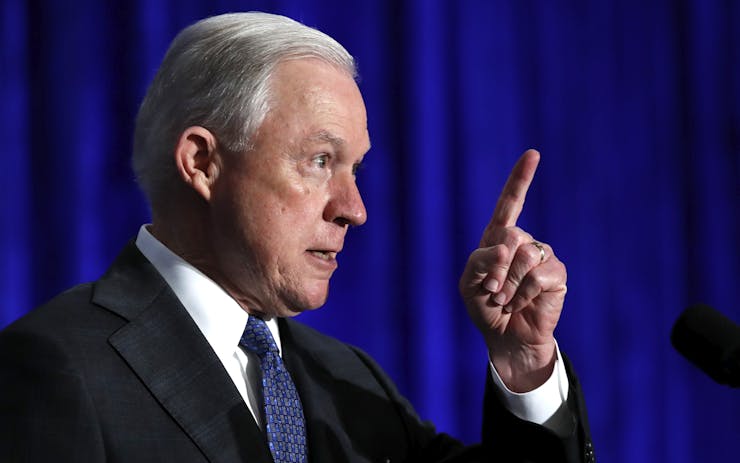On Tuesday afternoon, Attorney General Jeff Sessions stood before a crowd at DARE America’s 30th International Training Conference in Grapevine, TX, and told the organization how grateful he was for its support of the war on drugs.
“No doubt about it. It helped turn the tide.”
When the anti-drug group was founded in Los Angeles in 1983, the nation’s inner cities were on the precipice of a crack epidemic. “The nation rose to the occasion, and we successfully reversed those trends,” recalled Sessions, who was the US attorney for Georgia at the time.
“DARE became fundamental to our success,” he claimed. “No doubt about it. It helped turn the tide.”
One problem: Contrary to Sessions’ recollections, DARE didn’t work. Not according to the federal government, at least. In 2003, the US Government Accountability Office found “no significant differences in illicit drug use” as the result of the program. Numerous other studies supported that finding, reporting “no significant differences” between DARE students and others.
That didn’t stop Sessions from singing DARE’s praises on Tuesday—or even offering an endorsement from President Donald J. Trump himself.
“We know it worked before, and we can make it work again,” Sessions told the audience. “I support you, the president supports you, and we are determined to see if we can make a big difference in America today—and I believe that we can.”
JUST IN—Asked for evidence to support Sessions’s claim DARE worked & sentencing reform caused violence, spokesperson says: “Decline comment” pic.twitter.com/X7sH7wk9vt
— Dominic Holden (@dominicholden) July 11, 2017
Since taking office as Trump’s attorney general, Sessions has pushed hard to restart the drug war, urging tough prosecutions and severe criminal penalties. And although much of his rhetoric has focused on the opioid epidemic and cross-border drug cartels, he’s taken aim at legal cannabis, too.
In February, he claimed there’s “more violence around marijuana than one would think.” In April, his Justice Department began reviewing cannabis enforcement and the so-called Cole memo, which set an unofficial DOJ policy of respecting state cannabis laws. And in May, he sent a letter to congressional leaders asking them to remove a federal spending provision that prevents prosecutors from interfering with state-legal cannabis.
Over the course of his roughly 20-minute speech Tuesday, Sessions again spoke primarily on the scourge of opioids—both those prescribed by doctors and sold on the street. When he did bring up cannabis, however, he lumped it in with other dangerous drugs.
Substances are “now more powerful, more addictive, and more dangerous than ever. Even marijuana THC content is up several times,” he said. “They’re not just dangerous for users. Even being accidentally exposed to just a few grams of fentanyl can kill a police officer or a paramedic.”
The nation’s ongoing opioid epidemic kills nearly 100 Americans each day. Prescription drug overdoses are now the leading cause of accidental death in the United States.
Sessions is right to draw attention to the tragedy of opioid abuse. (“I’m so pained,” he said. “It hurts me so badly, to see the trends we’re on today.”) But he’s wrong to see cannabis as part of the problem. In fact, there’s good reason to believe legal cannabis has saved more lives than DARE has.
In 2014, a study found that states with medical marijuana laws saw 25% fewer deaths from opioid overdoses than states without. And early evidence suggests that cannabidiol (CBD), a non-intoxicating compound produced by the plant, could actually help treat addiction. A few drug-rehab clinics have started using cannabis to help wean addicts off harder drugs, and some states have even considering adding opioid addiction as a qualifying condition for medical marijuana.
Moreover, the popular myth that cannabis acts as a so-called gateway drug to harder drug use has largely been disproven. Even Sessions’ predecessor, then-Attorney General Loretta Lynch, said in September 2016 that “It’s not as though we’re seeing that marijuana is a specific gateway.”
“When we talk about heroin addiction, we usually, as we have mentioned, are talking about individuals that started out with a prescription drug problem, and then because they need more and more, they turn to heroin,” she said. “It isn’t so much that marijuana is the step right before using prescription drugs or opioids.”
That might be news to Sessions—at least if he’s siding with DARE. When Leafly called the organization in February 2016 asking if it still saw cannabis as a gateway drug, DARE didn’t know. “To be quite honest, I really don’t have an answer,” a spokesperson said.
So why is the attorney general telling DARE things like, “We need you. We really need DARE”?
Apparently because so many people still remember the program from when they were kids.
“Whenever I ask adults around the age of 30 about prevention programs and what they remember, they remember the DARE program,” Sessions said Tuesday. “They consistently do.”
It’s not entirely clear what that’s supposed to prove. A lot of us remember Australia’s Stoner Sloth, too—as a joke.
I’m 31. I was in a DARE program in elementary school. I even sang a solo in my class’s DARE musical. (I’m pretty sure it was this song.) Now, almost 20 years later, I work for a cannabis publication. I’m all about responsible use, but I’ve long abandoned “just say no.”
If Sessions is serious about wanting to save lives and improve communities in his role as AG, he’ll need to improve his appreciation for nuance. Public policies based on harm reduction sometimes seem counter-intuitive at first. Treating drug addiction with another drug? At first blush, that’s outlandish. But evidence suggests it might work—if not for everyone, at least as well as a largely defunct anti-drug organization born of drug war dogma.





